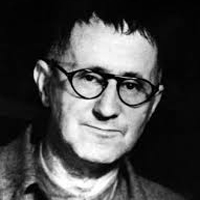Significance of Telescope in Brecht's Galileo
Galileo, the character who has been given a central role in the play with the same name is a scientist credited with the invention of the telescope and the instrument stands for the spirit of science. The telescope is a tool used by astronomers to find out the facts about the heavenly bodies and their movement.

Bertolt Brecht (1898-1956)
It is the window through which scientists can get the objective knowledge of the world. It is opposed to religions orthodoxy which stands for superstition, blind faith and ignorance as well as status quo. What Galileo does with the telescope is the key to understand the conflict in the play. The tension is between science represented by Galileo and the telescope and the orthodoxy of religion represented by the church and the different people of the ecclesiastical hierarchy.
The play refers to a time in European history when the church was the caretaker of truth. Scientific truth or the spirit of scientific inquiry was suppressed. The role of religion was very great. The scientists had to fact danger to life and were kept under observation. The church was the arbiter of truth, I all areas of knowledge. However the fervor for scientific inquiry was gaining ground. If religion doesn’t test established truths and holds fast to them science examines established truth. The role of the telescope is very great, but it was seen with suspicion by the popes and other churchmen. It had to be used secretly because of the hostile religious environment. Telescope in the play Galileo poses threat to religious faith and the authority by challenging earlier scientific theories and the belief held by the church. In the conflict between science and the religion, science has suffered. However, when ‘discourse’ is smuggled out of Italy into Holland, it reaches the masses and they finally know what truth. In a way it is the victory of the telescope. Thus, telescope occupies a great place in the play Galileo.
Galileo Study Center
Introduction of Brecht's Galileo
Dramatic Irony in Brecht's Galileo
Brecht's Dramatic Technique in Galileo
Conflict between Faith and Doubt in Galileo
Elements of Experimental Modernism in Galileo
Marxist Standpoint of Brecht in Galileo
Spirit of Science and Galileo in Brecht's Galileo
 |
bachelorandmaster.com |